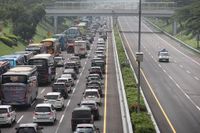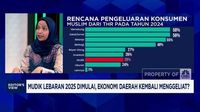As the 2025 Lebaran season kicks off, significant changes in travel patterns and public service operations have emerged, reflecting both the challenges and adaptations of the holiday period.
On March 27, 2025, CNBC Indonesia reported that the Mudik Lebaran season has officially begun, but this year, a notable decrease in the number of travelers has been highlighted. The Managing Editor of CNBC Indonesia, Suhendra, along with Wilda Asmarini, discussed these trends during the Closing Bell program, indicating a shift in how people are approaching the holiday travel.
In East Kalimantan, the provincial government has announced a detailed holiday schedule for employees in anticipation of Hari Raya Idul Fitri 1446 Hijriah. Deni Sutrisno, the Head of the Regional Civil Service Agency (BKD) of East Kalimantan, confirmed that the official leave will commence on Friday, March 28, 2025, and extend until April 7, 2025. This leave applies to all employees, including civil servants and honorary staff, ensuring that everyone can enjoy the festivities.
Before the official break, some agencies have implemented a work-from-anywhere (WFA) system starting from March 24, 2025. Sutrisno emphasized the importance of maintaining public services during this period, particularly in vital sectors such as health. He stated, "Public services must continue to operate, especially in vital sectors such as health." This sentiment was echoed by Sri Wahyuni, the Regional Secretary of East Kalimantan, who stressed that each agency must arrange employee schedules to ensure optimal service during the holiday.
Furthermore, the schedule includes designated joint leave for Nyepi Day on March 28 and 29, followed by the Idul Fitri celebration from March 31 to April 1. Employees will return to work on April 8, 2025, after the extended holiday period.
Traffic management during this busy season has also become a focal point. On the same day, March 27, 2025, traffic flow on the Trans-Java Toll Road was reported to be quite heavy since the morning. The National Traffic Police Corps (Korlantas) implemented a contraflow system earlier than planned due to significant congestion. Inspector General Agus Suryonugroho noted that traffic had started to build up from the early hours, prompting immediate action to alleviate the bottleneck.
The contraflow system commenced at 08:00 WIB on several sections of the toll road, specifically between Kilometer 109 to 132 and Km 162 to 169. Initially, Korlantas had intended to start this measure at 14:00 on the same day, but the surge in traffic forced an earlier implementation. Additionally, a local oneway system was also put in place from Km 70 to Km 188 due to an unexpected spike in vehicles at Km 71.
As the holiday approaches, the volume of vehicles is expected to continue rising. Korlantas has indicated that if traffic congestion persists, a national oneway system may be implemented on March 28, 2025. The threshold for this decision is based on the number of vehicles at Km 71, which had already reached 6,300 vehicles by Thursday morning.
Ria Marlinda Paallo, Vice President of Corporate Secretary and Legal at PT Jasa Marga, emphasized that these traffic management strategies are essential to handle the increasing volume of holiday travelers. She urged road users to prioritize safety and ensure their vehicles are in good condition before embarking on their journeys. This includes checking fuel levels and ensuring sufficient electronic money balance for toll payments.
According to PT Jasa Marga, a total of 955,923 vehicles left the Jakarta, Bogor, Tangerang, and Bekasi (Jabotabek) areas between March 21 and March 26, 2025. This figure represents a 1.5 percent increase compared to the previous year's Lebaran holiday and a 13 percent increase compared to normal traffic levels. The majority of these vehicles, approximately 469,762 (49.1 percent), were headed east towards Trans-Java and Bandung, while 284,373 (29.7 percent) were traveling west towards Merak, and 201,788 (21.1 percent) were heading south towards Puncak.
The government and various agencies are working diligently to ensure that public services remain uninterrupted during this festive period, while also managing the increased travel demands. As the holiday approaches, both travelers and service providers are adapting to the new norms of holiday travel and public service operation.





